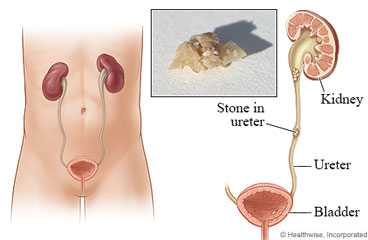
Your Care Instructions
Kidney stones are formed when salts, minerals, and other substances normally found in the urine clump together. They can be as small as grains of sand. In rare cases, they can be as large as golf balls.
For most children, passing a stone takes at least 24 to 48 hours. While the stone is traveling through the ureter, which is the tube that carries urine from the kidney to the bladder, your child will probably feel pain. The pain may be mild or very severe. Your child may also have some blood in his or her urine. As soon as the stone reaches the bladder, any intense pain should go away.
If a stone is too large to pass on its own, your child may need a medical procedure to help pass the stone.
Follow-up care is a key part of your child's treatment and safety. Be sure to make and go to all appointments, and call your doctor if your child is having problems. It's also a good idea to know your child's test results and keep a list of the medicines your child takes.
How can you care for your child at home?
- Make sure your child drinks plenty of fluids.
- Be safe with medicines. Give pain medicines exactly as directed.
- If the doctor gave your child a prescription medicine for pain, give it as prescribed.
- If your child is not taking a prescription pain medicine, ask your doctor if your child can take an over-the-counter medicine.
- Do not give your child two or more pain medicines at the same time unless the doctor told you to. Many pain medicines have acetaminophen, which is Tylenol. Too much acetaminophen (Tylenol) can be harmful.
- Your doctor may ask you to strain your child's urine so that you can collect the kidney stone when it passes. You can use a kitchen strainer or a tea strainer to catch the stone.
- Have your child take medicines exactly as prescribed. Call your doctor if you think your child is having a problem with a medicine. You will get more details on the specific medicines your doctor prescribes.
- Apply heat to sore areas on your child's back or stomach for 20-minute periods. Moist heat (hot pack, bath, shower) works better than dry heat.
Preventing future kidney stones
Some changes in your child's diet may help prevent kidney stones. Depending on the cause of your child's stones, your doctor may advise your child to:
- Drink plenty of fluids.
- Avoid coffee, tea, and grapefruit juice.
- Do not take more than the recommended daily dose of vitamins C and D.
- Avoid antacids such as Tums, Mylanta, or Maalox.
- Limit the amount of salt (sodium) in the diet.
- Eat a balanced diet that is not too high in protein.
- Avoid foods that are high in a substance called oxalate, which can cause kidney stones. These foods include dark green vegetables, rhubarb, chocolate, wheat bran, nuts, cranberries, and beans.
When should you call for help?
Call your doctor now or seek immediate medical care if:
- Your child has symptoms of a kidney infection. These may include:
- Pain or burning when he or she urinates.
- A frequent need to urinate without being able to pass much urine.
- Pain in the flank, which is just below the rib cage and above the waist on either side of the back.
- Blood in the urine.
- A fever.
- Your child has pain that is not controlled by pain medicine.
Watch closely for changes in your child's health, and be sure to contact your doctor if:
- Your child does not get better as expected.
Where can you learn more?
Go to http://www.healthwise.net/patientEd
Enter M345 in the search box to learn more about "Kidney Stone in Children: Care Instructions".
Current as of: April 30, 2024
Author: Ignite Healthwise, LLC Staff
Clinical Review Board
All Healthwise education is reviewed by a team that includes physicians, nurses, advanced practitioners, registered dieticians, and other healthcare professionals.

